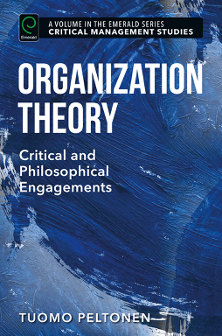
Foreword
ISBN: 978-1-78560-946-6, eISBN: 978-1-78560-945-9
ISSN: 2059-6561
Publication date: 9 March 2016
Citation
(2016), "Foreword", Mills, A.J. (Ed.) Organization Theory (Critical Management Studies), Emerald Group Publishing Limited, Leeds, pp. xiii-xiv. https://doi.org/10.1108/S2059-65612016023
Publisher
:Emerald Group Publishing Limited
Copyright © 2016 Emerald Group Publishing Limited
Our second book in the new Critical Management Studies (CMS) series, Organization Theory: Critical and Philosophical Engagements is our first textbook. Revised from the original Finnish version, the book was shaped in relation to the now classical critical work of Burrell and Morgan – Sociological Paradigms and Organizational Analysis.
Using this paradigmatic approach as a starting point, Tuomo Peltonen adopts sociological paradigms as an epistemological framework around which he does a number of things. To begin with he locates sociological paradigms in (historical) context and its impact on the field of Organization Theory. In the process, Peltonen discusses how the work influenced the emergence and shape of Critical Management Studies as a distinct disciplinary field while somehow retaining its skeptical stance. It is a stance that Peltonen also embraces in using the idea of sociological paradigms as a point of departure, and something to react to, in discussing developments in the field of Organization Theory.
Underlying the focus on sociological paradigms, Peltonen’s skeptical stance places him somewhere in the intersection of the amorphous critical scholarship of management (csm) and the seemingly more paradigmatically coalesced notion of Critical Management Studies (CMS). The former includes a multitude of scholars who take a critical stance toward the study of social and organizational life by examining theories and practices of managing and organizing for their impact on human beings. This includes those, such as feminists, environmentalists, etc., who prefer broader research descriptions rather more dedicated theoretical positions and who, like Peltonen himself, prefer to draw on different critical traditions in undertaking a particular research project. It also includes scholars who are more comfortable in identifying with a more specific theoretical position – such as Marxism for example. For various reasons, including coalition politics, epistemological strategies, identity work, institutional pressures, and the socio-politics of knowledge, many of these scholars have come to constitute the greater majority of those identifying themselves as CMS scholars. This sets up various creative tensions within CMS scholarship between those who are more-or-less at ease with embracing the notion of a Critical Management Studies and those who remain skeptical about the exclusionary potential of any paradigmatic stance.
Peltonen draws on these intersections and creative tensions as part of an epistemological framework for helping readers make sense of the development of various theories of organization, of the constitution of Organization Theory as a disciplinary field, and the development of CMS itself. His critically skeptical stance also allows him to range far and wide beyond this focus to explain the development and implications of various approaches over time. In the process, he draws on his own theoretical areas of interest that include actor-network theory, postcolonial theory, neo-Marxism. The result is a thought provoking work that encourages us to think about the dynamics and socio-politics of theory development over time. As such it is an interesting read in itself for organizational scholars as well as a useful text for engaging students and helping them to grasp the mechanics of a range of alternative theories.
- Organization Theory
- Critical Management Studies
- Praise for the Book
- Organization Theory
- Copyright Page
- Acknowledgments
- Foreword
- Introduction
- Classical Organization Theory
- Cultural Modern Organization Theory
- Rational Modern Organization Theory
- Interpretative Organization Theory
- Critical Organization Theory
- Postmodern Organization Theory
- Conclusions and Discussion
- References
- Index